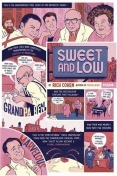BKMT READING GUIDES
Sweet and Low: A Family Story
by Rich Cohen
Paperback : 288 pages
4 clubs reading this now
0 members have read this book
Sweet and Low is the bittersweet, hilarious story of Ben Eisenstadt, who invented sugar packets and Sweet'N Low, and amassed the great fortune that would later destroy his family. It is a story of immigrants, Jewish gangsters, and Brooklyn; of sugar, saccharine, obesity, and diet crazes; ...
Introduction
Sweet and Low is the bittersweet, hilarious story of Ben Eisenstadt, who invented sugar packets and Sweet'N Low, and amassed the great fortune that would later destroy his family. It is a story of immigrants, Jewish gangsters, and Brooklyn; of sugar, saccharine, obesity, and diet crazes; of jealousy, betrayal, and ambition. Disinherited along with his mother and siblings, Rich Cohen has written a rancorous, colorful history of his extraordinary family and their pursuit of the American dream.
Editorial Review
Sweet and Low by Richard Cohen bills itself as "the unauthorized true story of one Brooklyn family." And what a family. Cohen, the disinherited grandson of the artificial sweetener Sweet 'n' Low's inventor, combines two parts Horatio Alger-memoir, one part cultural commentary and three parts personal criticism into a fascinating snapshot of American life, immigrant experience and a broad sermon on the perils of fortune. Cohen's maternal grandfather, Ben Eisenstadt, a mid-grade inventor and Brooklyn restaurateur concocts the idea of selling sugar in individual packets--a revolutionary concept in the age of crusty, unsanitary sugar dispensers. His idea stolen by the big sugar companies, Cohen squeaks out a post-war living selling his packets in their shadow until he and his son, Marvin, invent the formula for the saccharine sweetener and catch the first big wave of the American diet craze. Those little pink packets create a vast fortune soon tarnished by interfamily squabbles, Mafia influence, FDA edicts and, mostly, the baser aspects of human nature--greed, jealousy and pride. Cohen, a writer for Rolling Stone and The New Yorker, among other publications, weaves a compelling and often biting narrative about his mother's family. Using those pink packets as metaphor, he paints a dystopic portrait of the American Dream, that, in his family's case, was as devoid of nourishment as any artificial sweetener.--Jeremy PughDiscussion Questions
From the Publisher:1. At the beginning of Sweet and Low, Rich Cohen says, “To be disinherited is to be set free.” What sort of freedom does he have in mind? Is there such a thing as negative freedom? How does this relate to the line in the Janis Joplin song, “Freedom’s just another word for nothing left to lose.” And: Do you believe him?
2. Why does the author call this a Brooklyn story? How do the lives of these people connect to or amplify the history of the borough?
3. He describes his family as expatriates—what does he mean by this? Is Sweet and Low an outsider’s story? How did growing up in the Midwest, away from the main players, determine the story he tells?
4. Is this a story of the American dream? If so, what does it tell you about the health of those old dreams?
5. Who is the most powerful member of the Eisenstadt family? Who drives the action? Is it Ben, Betty, Marvin, Gladys, Ellen?
6. Why did Aunt Gladys take to her bed? Why did she stay? Why do you think she finally left the house?
7. Why was Ellen disinherited? (If you know the answer, please contact the author through his publicist, c/o Picador, 175 Fifth Avenue, New York, NY 10010). Could she have done anything differently? Who, if anyone, is to blame, and why?
8. What do you think the author means when he says Grandma Betty had a parenting style that can be described as, “Love is finite.” How did Betty’s childhood determine the way she raised her own children.
9. How might things have been different if Uncle Abraham had lived?
10. How do some of the key parts of the story serve as symbols in the life of the family? Saccharine, the sugar packet, the fish tank in the factory where the tropical fish died?
11. What do you think happened at Cumberland Packing at the time of the scandal? Did Uncle Marvelous know about the criminal infestation? Did Grandpa Ben? If so, why did he do nothing to avert disaster?
12. Based on this story, can you come up with some reasons why a family business tends to last no more than three generations? What roles do the different generations play? Fathers, sons, and grandsons? How might a person upset this pattern and save the company?
13. At the end of the book, the author and his family get in a plane and fly away. What does this mean? What do you think the author is trying to say?
Book Club Recommendations
Recommended to book clubs by 0 of 0 members.
Now serving over 80,000 book clubs & ready to welcome yours. Join us and get the Top Book Club Picks of 2022 (so far).
Get free weekly updates on top club picks, book giveaways, author events and more








